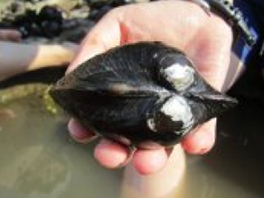Featured Article
UT Tyler’s Dr. Joshua Banta Abounds in Biology Research as CEBC Director
 A son of a university biologist, Dr. Joshua Banta understood what the profession was
all about growing up and eventually followed in his father’s footsteps. His parents
also instilled in him a love for the liberal arts.
A son of a university biologist, Dr. Joshua Banta understood what the profession was
all about growing up and eventually followed in his father’s footsteps. His parents
also instilled in him a love for the liberal arts.
The varied interests Banta developed during his own academic journey – including philosophy, sociology, theater and economics – are what makes him enjoy life, and ultimately enjoy teaching students at The University of Texas at Tyler.
“As experts in our fields, with access to educational and research resources, we in academia are in a unique position to show our students how the world works,” said Banta, an associate professor who has served UT Tyler for 10 years. “A broad higher education in science and the liberal arts empowers the next generation of leaders, who go on to do great things.”
Banta is among the dedicated professors in the department who provide such education and research opportunities for UT Tyler students, noting the appreciation for the faculty within the College of Arts and Sciences can be seen and felt throughout the community.
“Our contributions to our disciplines and to our community are valued,” said the professor, whose teaching focuses on evolutionary genetics, landscape ecology, geographic information systems and plant biology. “Tyler understands that a thriving university community enriches our whole city and our whole region – and vice versa. We feel appreciated by UT Tyler and by East Texas, just as we are grateful in return.”
In addition to teaching, Banta also directs the university’s Center for Environment, Biodiversity and Conversation. Banta relishes in the role, since his research focuses on evolutionary ecology – which studies populations in their natural environments and how they change genetically and morphologically through time. Specifically, he studies rare species that are found only in Texas and surrounding regions, and how they can be protected from extinction.
“By safeguarding our unique wildlife, we protect our forests and our rivers, upon which we depend for our recreation and our survival,” Banta said. “In the process, we can also learn basic facts about how species interact with each other by using the rare species as illustrative models.”
 One current project funded by state and federal partners is on freshwater mussels,
which are like clams that live in local lakes and rivers. Mussels are important in
protecting the health of waterways because they filter tremendous quantities of water
to find their food, he said, noting that it is much cheaper and more practical to
use a healthy ecosystem to keep waters clean and safe than using chemicals and machines.
One current project funded by state and federal partners is on freshwater mussels,
which are like clams that live in local lakes and rivers. Mussels are important in
protecting the health of waterways because they filter tremendous quantities of water
to find their food, he said, noting that it is much cheaper and more practical to
use a healthy ecosystem to keep waters clean and safe than using chemicals and machines.
His work seeks to identify the habitats of these mussels and create range maps that show where they are found and what types of environments in which they live. This work, he added, allows policymakers and land managers to make more informed decisions about how to develop and use land in ways that keep the state beautiful and clean.
“We would spend a lot more money on cleaning our water if we didn't preserve biodiversity like mussels, and even then, we'd be drinking and playing in dirtier and more hazardous water without them,” he said.
Banta also is interested in how climate change will affect rare species in East Texas.
“Research suggests that the future habitat for mussels will shrink, even as our area is forecasted to become more frequently flooded,” he said. “We think this counterintuitive finding for a riverine species has to do with how the geochemistry of the water will change.”
Banta advises students to follow their passions, and to embrace their diverse experiences and the world’s beauty.
“The more students can cultivate a sense of wonder about the world and all of its facets, the more they find the inspiration to achieve amazing things that make them happy, and enrich their community and society,” Banta said.
Aside from teaching and researching, he is actively involved in the community, organizing Darwin Day in Tyler for the past seven years. Events celebrate scientific exploration and discovery with a focus on evolution and biodiversity.
In his free time, Banta enjoys reading, the arts, outdoor activities, computer programming and developing content for his YouTube channel dedicated to computational analyses of biological data, with thousands of views worldwide. He and his wife have two children.
#CAS
Read more from the March 2021 issue!
- A Positive Base for Career Success: UT Tyler Makes Dream Come True for ACS Student Chapter President
- A Heart for the Homeless: UT Tyler Math Major Aids Community Service Efforts
- The Best Part of Her Day: Wick Keeps East Texas Children Healthy
- Alumnus Solouki Finds Encouraging Educators in Chemistry Department




